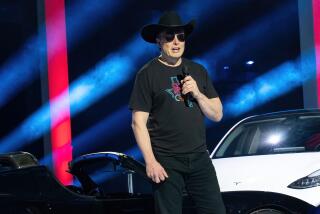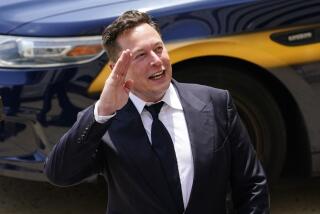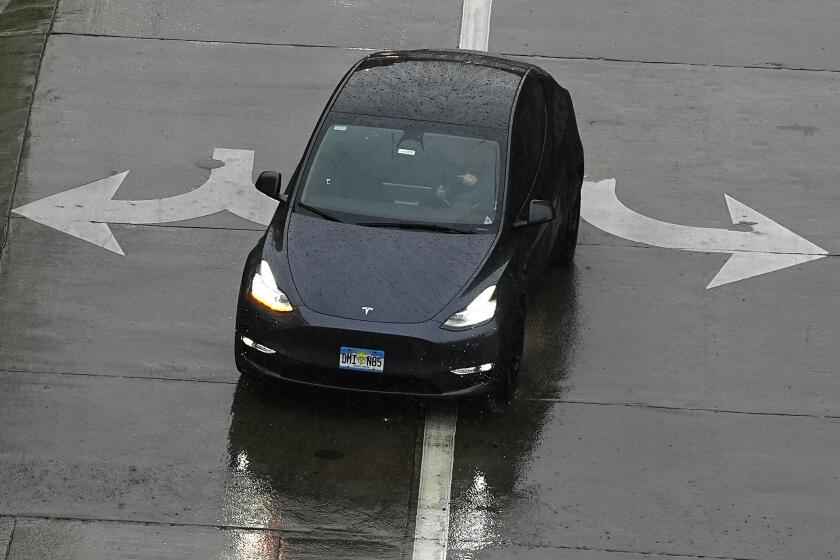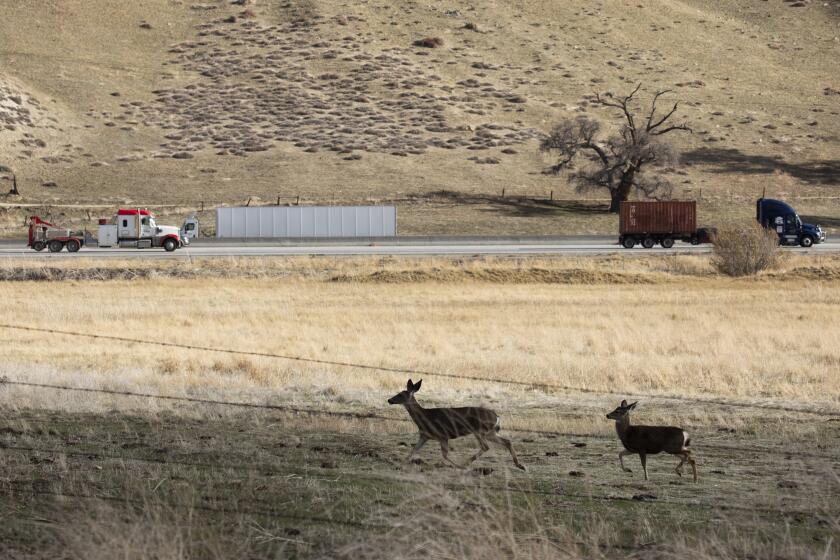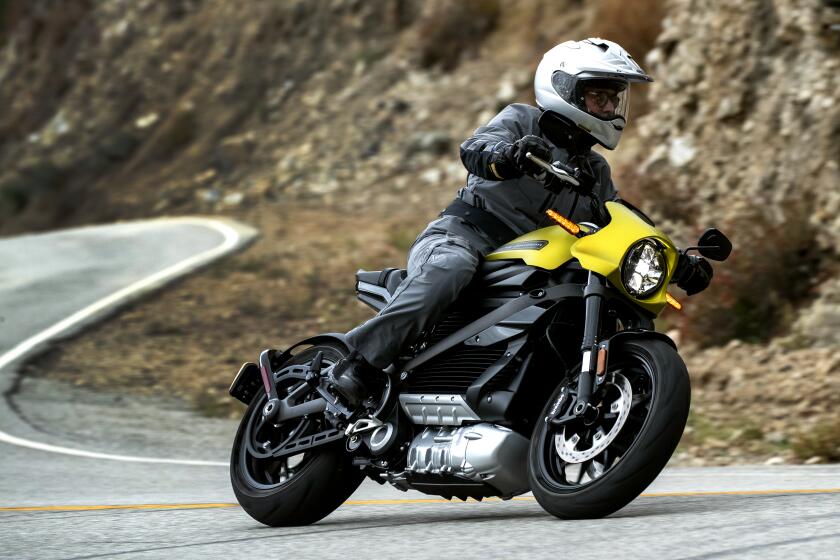Tesla mines gold in Silver State
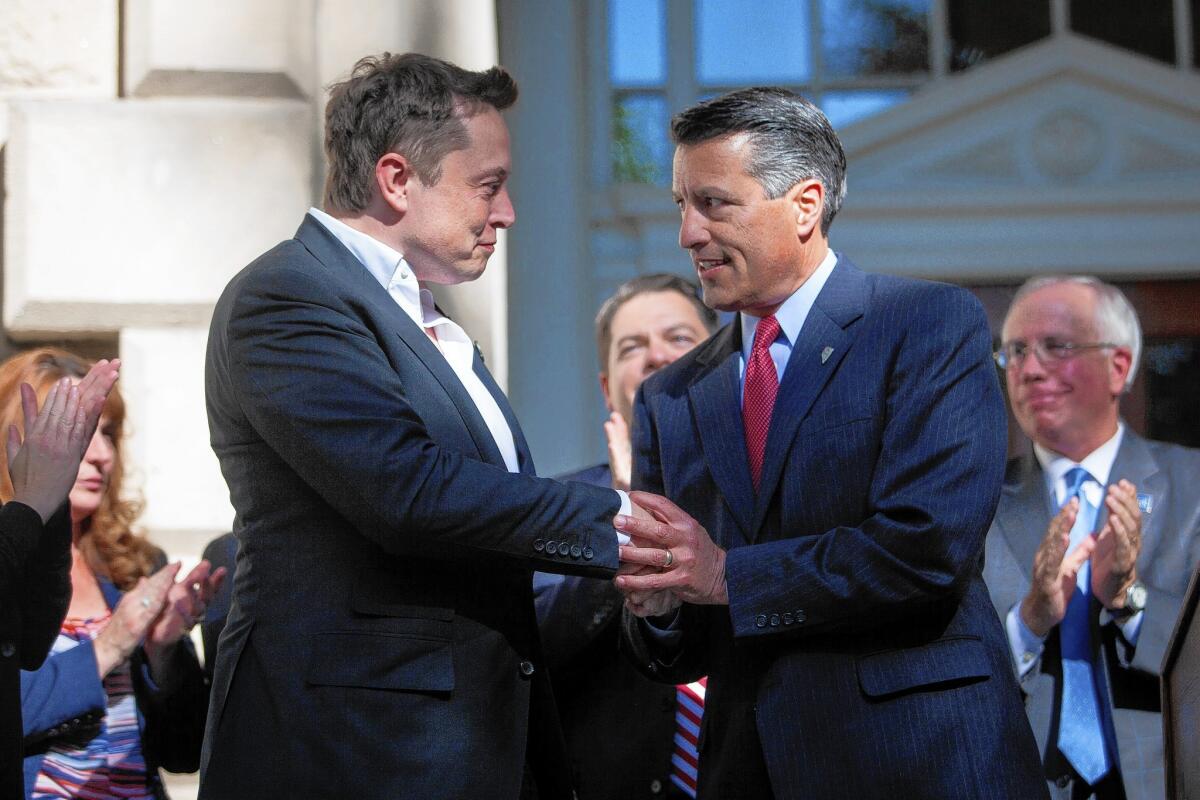
Nevada’s economic incentives for Tesla Motors won the state a coveted battery factory and an estimated 6,500 jobs, but at one of the highest costs a state has ever paid to lure a company — nearly $1.3 billion.
The lavish dowry reaffirms Tesla chief Elon Musk’s reputation as a maestro of public subsidies. Adept at media and politics, Musk has raked in hundreds of millions in government support for cutting-edge electric cars and spacecraft.
The package — more than double what California was poised to offer — allows Tesla to operate in Nevada essentially tax-free for a decade. The Palo Alto automaker won’t pay sales, property or business taxes.
Tesla will also collect $195 million in tax credits that the company can sell for cash. Part of that will come from state pledges of $12,500 for each of the first 6,000 jobs Tesla creates.
Officials from other states and Nevada public policy experts question whether the deal will pay off for Nevada. Some argue it will starve local schools and agencies tasked with providing services for the influx of new workers. They say it could hurt Nevada’s bargaining power in future negotiations with relocating or expanding businesses.
Nevada Gov. Brian Sandoval says the agreement, announced Thursday, is worth every penny and will bring his state $100 billion in economic activity over two decades.
Tesla and its partner Panasonic plan to spend about $5 billion on the factory, which will be built in Sparks, Nev., about five miles east of Reno. Tesla says the plant could slash battery costs by 30% through manufacturing efficiencies. It currently buys batteries from Panasonic.
The automaker needs the savings to launch its Model 3, a “mass market” sedan that will sell for around $40,000, or about half the cost of its current Model S sedan. The first batteries would roll off the line in about three years.
California, where Tesla manufactures its high-end electric cars — and sells a huge percentage of them — made its own pitch to win the factory. A key part of the proposal, however, became bogged down when some lawmakers resisted Tesla’s desire for a waiver of state environmental reviews. California also was prepared to offer Tesla about $500 million in mainly corporate income tax credits. Moreover, lawmakers passed a bill that allowed local governments to rebate property tax to companies making batteries and related electrical equipment.
“We fought hard for Tesla,” Gov. Jerry Brown said during a political debate Thursday night. “But Tesla wanted a massive cash upfront payment that I don’t think would be fair to the taxpayers.”
Matching Nevada’s largesse would have been hard for lawmakers on both sides of the political aisle.
Legislators “did not want to give the store away,” said state Sen. Ted Gaines (R-Rocklin).
The generous package raised eyebrows in Nevada, too.
“There’s a lot of euphoria and hoopla around this whole deal, but there are a ton of questions that come up and very little information so far,” said Andy Matthews, president of the conservative Nevada Policy Research Institute, which has been critical of state business incentives.
About a quarter of the incentives — $332 million — come in the form of local property tax breaks. Critics of such subsidies argue that they starve local governments and schools of funding.
“There’s no such thing as free growth,” said Greg LeRoy, executive director of Good Jobs First, a Washington research group that tracks business incentives across the country.
“This is in a low-population county, which will obviously create pressure for people to move to that county. You have to hire teachers, widen lanes, pick up trash, and all of that will get paid for by someone not named Tesla.”
Tesla did agree to pay $37.5 million toward K-12 education beginning in 2018, but critics said it is too early to gauge whether that will make up for the property tax shortfalls in the early years. It also plans to make a $1-million grant to the University of Nevada-Las Vegas for advanced battery research.
Some economic development experts argue that when states are wooing a specific company, they tend to overspend.
“If your political culture is such that the sky’s the limit, then how do you say no?” said Timothy Bartik, a senior economist at the W.E. Upjohn Institute for Employment Research in Kalamazoo, Mich. “By increasing your bargaining flexibility, you have actually decreased your bargaining leverage.”
Both Tesla and Hawthorne-based SpaceX, also run by Musk, have proved adept at exploiting government subsidies and other support.
“This is a guy who has the whole package, with the salesmanship and the buzz around the company,” LeRoy said. “He’s really been very shrewd and very savvy in media to help sell his products.”
Though it failed to woo the battery factory, California has made other moves to lure Musk’s business investments. Earlier this year, the Legislature passed a bill to exclude rockets, rocket parts and rocket fuel from local property tax, a move seen as a nod to SpaceX.
The automaker also has relied on other government programs to build its business. Buyers of Teslas and other electric cars receive $7,500 in federal income tax credit. They also get a $2,500 rebate from California. Moreover, Tesla has been able to sell other automakers about $150 million in government-granted environmental credits for its zero-emission vehicles.
In its bid for the factory, California was handicapped by high land and labor costs and, most important, high housing costs for Tesla’s workers, said Stephen Levy, of the Center for the Continuing Study of the California Economy in Palo Alto.
But there could be a silver lining, he said. Sparks, Nev., is on Interstate 80 and is only a two-hour drive from Sacramento and four hours from the Fremont factory where Tesla builds its cars. Levy predicted that the Sparks plant would prompt suppliers and related manufacturing plants to locate along the 80 corridor in Sacramento and possibly Stockton, just south of Sacramento.
Incentives aside, Tesla’s location for the battery factory makes business sense, analysts said.
Northern Nevada is home to one of the world’s largest deposits of lithium, a crucial element in the production of lithium-ion battery cells, and Sparks is located along major rail lines and freeways.
“If you look at the other states, there’s plenty of reasons to think that Nevada had a natural advantage,” said Stephen Brown, an economics professor at the University of Nevada-Las Vegas.
But whether the factory investment plays out the way both Tesla and Nevada envision remains to be seen.
Its business, while successful in the start-up era, remains speculative. Bringing down the cost of batteries remains a difficult prospect — and Tesla needs major cost cuts to deliver on the promise of selling its Model 3 by the hundreds of thousands. Its current business has yet to expand beyond low-volume cars that start at about $71,000 and climb to more than $100,000 with the largest battery option and other features.
Tesla is unlikely to meet its projections of selling 500,000 vehicles in the year 2020, including more than 300,000 for Model 3 sales, said Dean Frankel, analyst at Lux Research, a Boston technology research firm. Lux projects the automaker will sell about 240,000 vehicles that year.
“It would need to outsell the BMW 3 series, Mercedes C-class and the Audi A4,” he said.
The likely result is that it will take Tesla longer to deliver on promised investments in Nevada workers and infrastructure.
Nevada also is unlikely to see the projected employment gains, said Michael Bernick, former director of California’s Employment Development Department. Estimates of jobs from major investments in manufacturing or infrastructure are nearly always overstated, he said.
Still there’s a lesson for California, where the economy is seeing a decline in entrepreneurship, Bernick said. The state might better focus its efforts on finding the next innovative start-up.
“It is not so important that we didn’t get the Tesla factory,” Bernick said. “The problem is that we might not get the next Tesla.”
